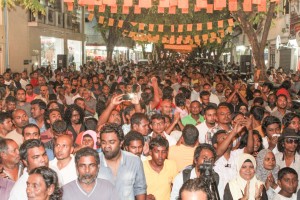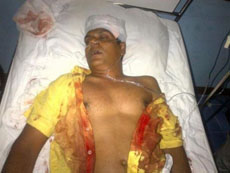Former President Mohamed Nasheed has called for investigations by the Anti-Corruption Commission (ACC) into government spending during his administration flagged by the Auditor General’s Office as ostensible violations of the Public Finance Act.
Speaking at a campaign rally in the Henveiru ward of Male’ on Wednesday night (June 19), Nasheed said he accepted the findings of audit reports concerning public finances during the three years of the Maldivian Democratic Party (MDP) government.
“We were the government that first started work with independent institutions in place. We were the government that had the good fortune of having been the target of audits by an independent Auditor General for the first time; and the government that had the opportunity to govern with the oversight of an independent Anti-Corruption Commission,” the MDP presidential candidate said.
“Our purpose, our wish, is for all government funds to be accounted for and for all expenditures to be transparent. I assure all citizens of the Maldives, I will not touch a single cent of your money,” he added.
Nasheed said he was pleased that of the MVR 31 billion (US$2 billion) spent by the MDP government from 2009 to 2011, the Auditor General’s Office only estimated that approximately six percent was “not spent in accordance with public finance regulations.”
“No one has said that [these expenses] involved corrupt dealings or facilitated corruption,” he stressed, calling for investigations by the ACC to determine whether corruption or misappropriation of funds had taken place.
Nasheed said he had studied all the audit reports of government ministries from 2009 to 2011 released by the Auditor General’s Office so far.
“What I want to note is that [expenditure] not being in line with public finance regulations does not mean corruption has taken place or that a criminal offence was committed,” he contended.
The Auditor General’s role was identifying expenditures made in breach of regulations, Nasheed explained, while the financial loss to the state as a result of the ostensibly illegal spending would be determined in light of investigations.
Taking examples of cases highlighted in audit reports, Nasheed referred to the purchase of five cars for government use flagged in the 2011 audit report of the finance ministry.
The audit report noted that a local company was contracted in December 2010 to buy five Nissan Sunny N16 Super Saloon cars for MVR 2.9 million (US$193,904).
However, the company delivered Nissan cars of the Ex Saloon model, the audit found.
“So what we have to find out is whether there was a difference in price between the two brands and which [brand] was cheaper,” Nasheed said.
The case reminded him of the Violet House group in Majeedhiyya School ordering a set of football boots when he was in school, Nasheed said.
“What they received was a set of key chain boots,” he said.
 On the Auditor General discovering that the MDP government spent MVR 13.9 million (US$901,426) to train 259 participants of the ‘Hunaru’ skills programme, Nasheed said the programme was brought to a halt after the “coup d’etat” on February 7, 2012 and no further participants were trained despite being enrolled.
On the Auditor General discovering that the MDP government spent MVR 13.9 million (US$901,426) to train 259 participants of the ‘Hunaru’ skills programme, Nasheed said the programme was brought to a halt after the “coup d’etat” on February 7, 2012 and no further participants were trained despite being enrolled.
The initial spending included capital expenditures for the skills training programme, which targeted leading 8,500 youth to the job market, Nasheed noted.
While the Auditor General’s Office calculated that MVR 50,000 (US$3,242) on average was spent to train a single participant, Nasheed contended that if the programme had concluded successfully, “we estimated at the time that the Hunaru programme could be conducted for about MVR 7,000 or MVR 8,000 per participant.”
On MVR 8.1 million (US$525,291) worth of unpaid bills in the aviation sector owed to the government, Nasheed called on the Auditor General’s Office to forward the case to the ACC for further investigation and to recover the outstanding payments.
“The national administration office of the North [Province] made illegal expenditures for travel [according to the audit report],” Nasheed continued “In this case, if these trips were made in violation of the regulations, we want it to be stopped and for those who do it – even if they were under our government – to receive the just punishment.”
Referring to the Auditor General alleging illegal expenditures for the November 2011 SAARC (South Asian Association for Regional Cooperation) in Addu City, Nasheed said the party wished to determine the nature of the expenses in question.
“I can certainly see the convention center built there, the roads laid in Hithadhoo and the water and sewerage systems as well as the harbour there,” Nasheed said, contending that the costs would not exceed the “concrete work” that was done.
However, he added, if the Auditor General believes there were instances of illegal spending for the SAARC summit, the cases should be properly investigated.
On MVR 168.4 million (US$10.9 million) worth of unpaid expatriate work permit fees owed to the government, Nasheed said the oversight was “worrying” and called for the Prosecutor General’s Office (PGO) to file court cases to recover the outstanding payments.
The former president also took note of the ACC’s recent investigative report that cleared the previous government of corruption in the awarding of a concession agreement to a consortium of Indian infrastructure giant GMR and the Malaysian Airports Holdings Berhard (MAHB) to develop and manage the Ibrahim Nasir International Airport (INIA).
Nasheed said he had rejected requests for meetings by the companies that had submitted proposals for the airport privatisation project as he believed such interaction ahead of the conclusion of the bidding process would not be appropriate.

